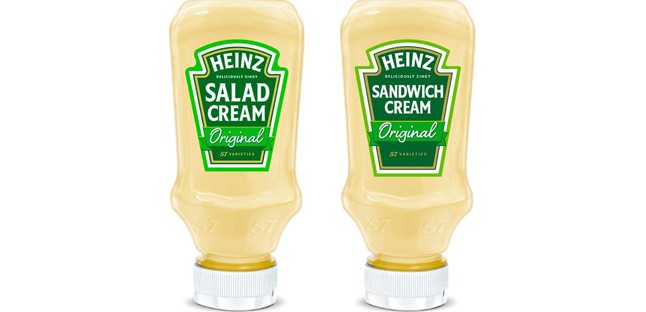Latest posts
A masterclass in creating value
What’s going on at parkrun?
Virtue-signalling all the way to the bank
Bud Light: brand purpose or virtue-signalling?
The Coddling of the American Mind, by Greg Lukianoff and Jonathan Haidt
Belonging, by Owen Eastwood
Such a simple thing
The Long Win, and The Scout Mindset
The Cult of We by Eliot Brown and Maureen Farrell
Coffee and covid modelling
By theme
Marketing strategy
Insight & metrics
Innovation & inspiration
Brand & positioning
Marketing communications
Business purpose
Leadership
By industry sector
Financial services
Retail
FMCG
Technology & start-ups
Consumer services
Business to business
Other sectors
By type
Books
Comment
Quotes
Thought leadership
Heinz Salad Cream is reportedly changing its name to Heinz Sandwich Cream. This is, we’re told, because people use it more in sandwiches than on salad. But if people have already figured out they can use salad cream in a sandwich, there’s no need to change the name.
Marketers seem to forget that most people think more about whether to pay for one hour or two in the car park, where there’s 50p at stake, than on the purpose or identity of the many brands they pick up in the weekly supermarket sweep. On the contrary, the role of brands is to simplify decision-making, reduce deliberation, and save time. Remove a familiar indicator at your peril. I recall a coffee brand which changed its pack design from an undistinguished one to a rich, story-telling one which was totally aligned with the brand values and purpose. Sales collapsed. The people who used to buy it couldn’t see the familiar pack on the shelf. To other people, it was just one more unknown brand among many.
So is changing a name worth the risk? It’s an endearing human trait that we tend to overestimate the upside of change, and underestimate the risks. Will Heinz Salad Cream reassert its dominance in the condiments aisle now that people are prompted by the name to deploy it on bread? Maybe. Or do Heinz, as comedian David Mitchell says, “stand on the brink of an epic cock-up: customers looking for Salad Cream suddenly won’t be able to find it and there is currently no one in the world, wandering around any supermarket anywhere, looking for a substance called Sandwich Cream. ‘Disappointed with your current sandwich-moistening agent? Why not try something you’ve never heard of from Heinz?'”
In the business to business world, changing logos or visual identity doesn’t matter too much, and can be a useful signifier of desired change for people inside the business. Short-term pain can lead to longer-term gain, if it’s part of a programme of change. Names, on the other hand, do matter. Not because they explain the business, but because it’s the familiar handle by which we know who we’re dealing with. Which is the definition of a name, is it not? It’s that simple. I was sorry to hear that the quirky independent market research agency Brainjuicer, which had a reputation for original thinking, delivering insight with energy and playfulness – and didn’t their name suit them – has changed its name. It’s now known as System something, presumably to reflect its intellectual underpinning, which is about System one and System two thinking in the human brain, as explained in Daniel Kahneman’s hit book, Thinking Fast and Slow. It’s odd that a business based on emotional, intuitive decision-making (system one) has made this change in pursuit of something rational. That it’s about them, rather than about what they do for clients, only makes it worse.
Marketing is darn simple if you start with the customer, think what matters to them, create value for them, and make it easy for them to obtain. Changing names, identities and pack designs throw obstacles in their way. The potential long-term gain better be worth the short-term risk of getting lost or forgotten. Changing the handle may seem quick and easy but it’s the substance that matters, so make sure the product or service offering is right before you worry about what it’s called.
A final thought. Fetishising names, believing they can signify the entire proposition, can leave people with egg on their faces, as illustrated here. A related blog post about job titles is here.
Latest posts
A masterclass in creating value
What’s going on at parkrun?
Virtue-signalling all the way to the bank
Bud Light: brand purpose or virtue-signalling?
The Coddling of the American Mind, by Greg Lukianoff and Jonathan Haidt
Belonging, by Owen Eastwood
Such a simple thing
The Long Win, and The Scout Mindset
The Cult of We by Eliot Brown and Maureen Farrell
Coffee and covid modelling
By theme
Marketing strategy
Insight & metrics
Innovation & inspiration
Brand & positioning
Marketing communications
Business purpose
Leadership
By industry sector
Financial services
Retail
FMCG
Technology & start-ups
Consumer services
Business to business
Other sectors
By type
Books
Comment
Quotes
Thought leadership
